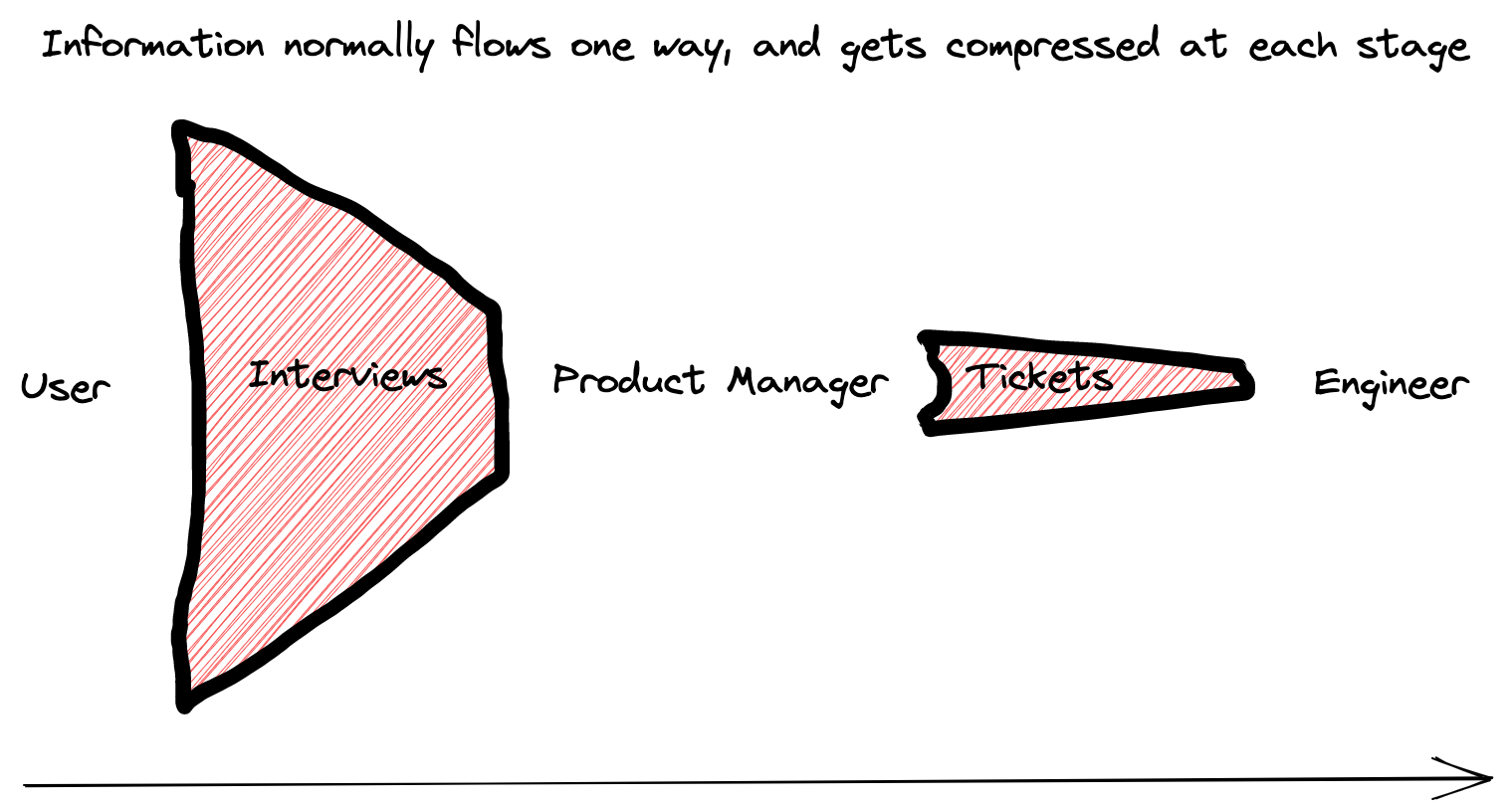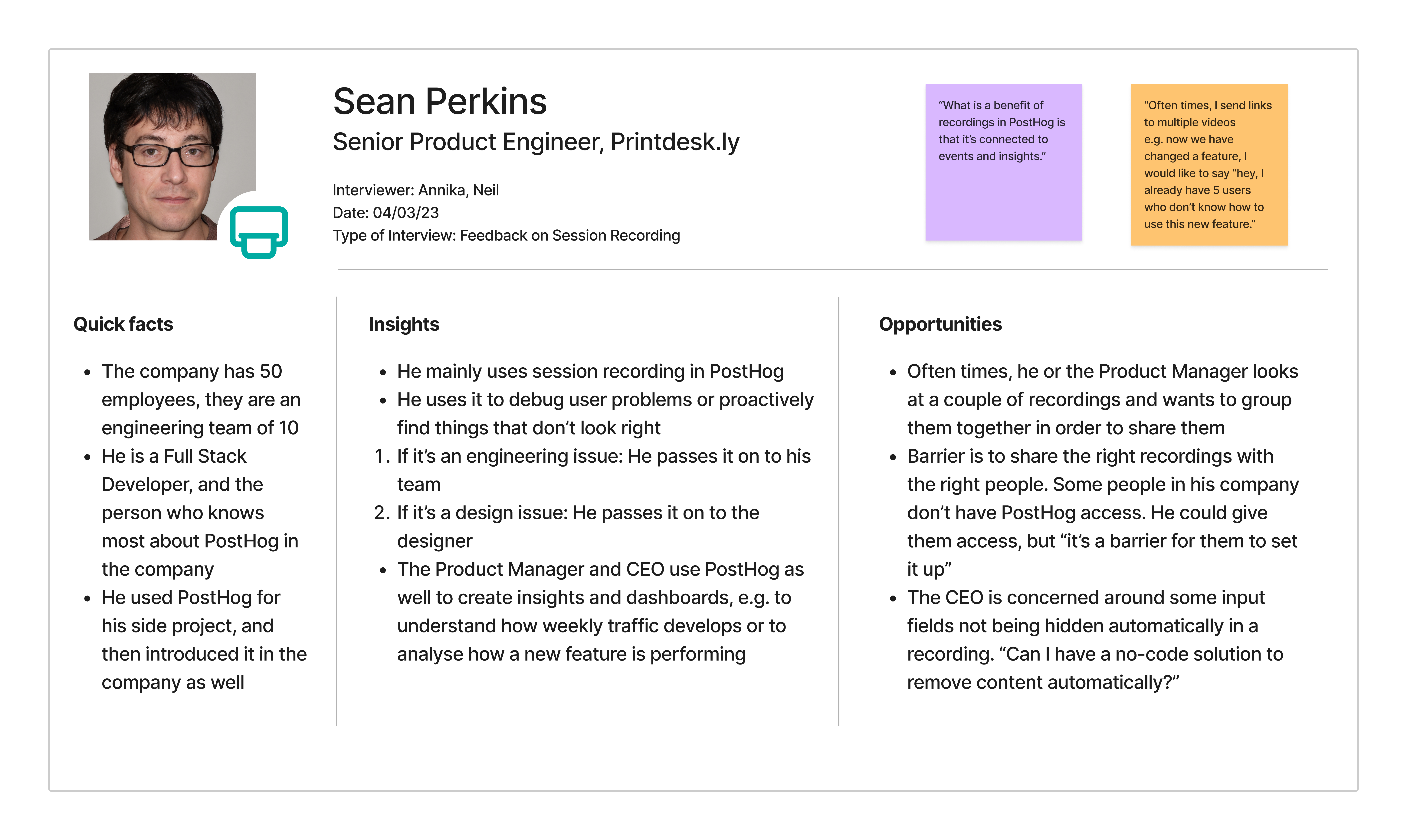
What we've learned about talking to users
Contents
Welcome to our new newsletter, Product for Engineers. We launched it because (1) there’s a real dearth of resources for engineers (and technical founders) who want to level-up their product skills; and (2) we believe embracing product engineering (i.e. engineers who do product) is a vital ingredient for successful startups.
This week’s theme is: Talking to users
This post was first published in our Substack newsletter, Product for Engineers. It's all about helping engineers and founders build better products by learning product skills. We send it (roughly) every two weeks. Subscribe here.
💬 10x engineers talk to users
In traditional tech companies, product managers (PMs) talk to users, and write tickets for engineers to ship. It looks something like this:

As Luke Harries explains in 10x engineers talk to users, this is an anti-pattern for any successful startup:
“At each stage, important context is lost. Information flows one way, so you can’t go deeper on the important areas, and engineers lose agency in what they're building and why.”
When engineers start talking to engineers:
“Information moves quickly and in both directions, boosting the signal. By increasing the signal you can quickly cut scope, realize you’re tackling the wrong problem, or come up with a more elegant solution.”
Luke’s tips for engineers who want to talk to users:
Automation is crucial. Use targeted in-app prompts to identify users to talk to.
Think about your goals. There are two basic interview types: problem exploration and solution validation.
Build async feedback loops. Zoom calls are just one way to talk to users; Slack can be just as (if not more) effective.

Subscribe to our newsletter
Product for Engineers
Read by 100,000+ founders and builders
We'll share your email with Substack
📸 User interviews + snapshots = action
If you’re talking to users, you need a quick and repeatable way to share what you learn. Annika Schmid shares our solution, interview snapshots:

Why do we like interview snapshots? 3 simple reasons:
- They're easy to create – 30 minutes if you do them right after an interview.
- They're easy to digest – no scrolling necessary, just drop a screenshot into Slack.
- They're conversation starters – each snapshot triggers lively debate and ideas.
Read her post for more user interview tips, and to download an editable snapshot template.
📚 Further reading on talking to users
Talking to users for founders / CEOs by YC-partner Eric Migicovsky
Eric’s talk is a foundational text in how CEOs should lead by example, and includes this nugget of wisdom:
"Some of the worst bad data that you may encounter is compliments. People may say, "Oh, I love the new design." Or, "Man, this thing is really useful." You may love that during the course of your user interviews but they actually are not useful information because it's not specific."
How game developer Gearbox “outwitted” tester feedback
The “Truth Team” at game developer Gearbox have three rules when interpreting feedback from game testers:
“Testers try to speak in fact, but they speak in emotion”
Testers do not like features they don’t understand but “the truth is [they] may not fully grasp what it is they're looking at or experiencing.”
Testers have expectations that may not match the developer's. “They speak about their experience, not what actually exists in the game.”
How to identify users with the most valuable feedback by a former Director of Product Analytics at Hubspot
Dan Wolchonok outlines why it’s important to seek out hard to find users:
“Even worse, in my opinion, is taking the existing feedback as representative of your user base, and only solving for the loudest segment of the customers or the customers that are most convenient to interact with.”
🦔 Useful guides for PostHog users
How to identify and analyze power users using cohorts, session recordings, and insights.
How gather feedback and book users interviews using PostHog apps.
How to understand user behavior using, funnels, user paths, and sessions recordings.
🤔 More good reads
What I Learned At Stripe by Zack Steinkamp: A great collection of learnings on how Stripe works, including why their engineers behave like product managers, and how Stripe automates a culture of gratitude.
How Acquirers See Your Company by StaySaasy: “Getting acquired is like meeting the world’s worst in-laws.” This post discusses the questions acquirers ask themselves beyond “do we like the team”.
The myth of exponential hypergrowth by Jason Cohen: “Hypergrowth” companies don’t grow exponentially. Jason Cohen goes in-depth on how fast-growing companies actually grow using real data. Essential reading.

Subscribe to our newsletter
Product for Engineers
Read by 100,000+ founders and builders
We'll share your email with Substack
PostHog is an all-in-one developer platform for building successful products. We provide product analytics, web analytics, session replay, error tracking, feature flags, experiments, surveys, LLM analytics, data warehouse, CDP, and an AI product assistant to help debug your code, ship features faster, and keep all your usage and customer data in one stack.









